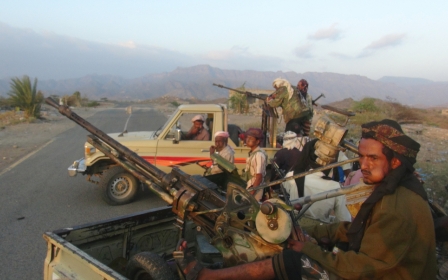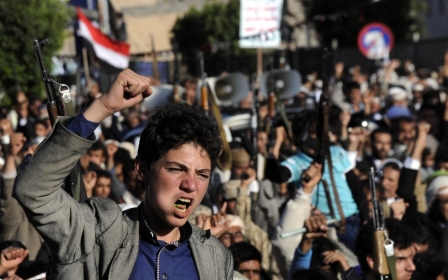Houthi militia blows up bridges to hamper advance by Yemen loyalists

The Houthi militia in Yemen have blown up several bridges in the mountainous southwestern Taiz province to hamper the advance of pro-government forces, military sources said on Tuesday.
Government forces backed by air and ground support from a Saudi-led coalition launched an all-out offensive last week to push the Houthis out of Taiz and break the siege of loyalists in its provincial capital.
Taiz is seen as crucial for the recapture of other central provinces and for opening the way to the Houthi-controlled capital Sanaa farther north.
It is also important for securing the south, where loyalists backed by the Saudi-led coalition have retaken five provinces since July, including Aden, seat of the provisional government of President Abd Rabbuh Mansour Hadi, who recently returned to the country.
The Houthi militia on Monday "blew up several bridges leading to Rahida to prevent the advance" of loyalist forces, said one of the sources in a reference to the province's second-largest city.
Military officials said this week that landmines planted by the Houthi militia have already been hampering the progress of government forces and had caused casualties.
Loyalist forces are now stationed 12 kilometres away from Rahida after they regained several positions in clashes that lasted until early Tuesday and left five Houthis and two pro-government fighters dead, according to the military sources.
Elsewhere, the Houthis said they repelled a loyalist advance in Dhubab region on the Red Sea, killing 20 and wounding another 20, a toll that could not be independently confirmed.
In the neighbouring Lahj province, farther south, Hadi visited Al-Anad airbase, where Yemeni and coalition commanders are deployed to supervise the Taiz offensive, a presidency source said.
"The visit is to oversee the military preparations to liberate Taiz," the source told AFP.
Hadi returned from exile in Saudi Arabia on 18 November, two days after the offensive to retake Taiz began.
A key member of the coalition, the United Arab Emirates, said on Tuesday that one of its soldiers in Yemen died of his injuries from a 4 September missile attack in Marib, east of the capital Sanaa.
His death in Germany, where he was hospitalised, raised to 64 the number of Emirati soldiers killed in the attack.
An Emirati minister on Monday blamed an influential Muslim Brotherhood affiliate party for the delays in retaking Taiz.
The advance has also been slowed down by the "betrayal of some Popular Resistance fighters," another military source said.
Emirati State Minister for Foreign Affairs Anwar Gargash tweeted on Sunday that "had it not been for the failure of Al-Islah and the Muslim Brotherhood to act," Taiz would already have been "liberated".
Al-Islah is a main component of the Popular Resistance which also groups tribesmen, soldiers and southern separatists.
The United Nations says a total of more than 5,700 people have been killed in Yemen since the Saudi-led intervention began in March, nearly half of them civilians.
New MEE newsletter: Jerusalem Dispatch
Sign up to get the latest insights and analysis on Israel-Palestine, alongside Turkey Unpacked and other MEE newsletters
Middle East Eye delivers independent and unrivalled coverage and analysis of the Middle East, North Africa and beyond. To learn more about republishing this content and the associated fees, please fill out this form. More about MEE can be found here.




